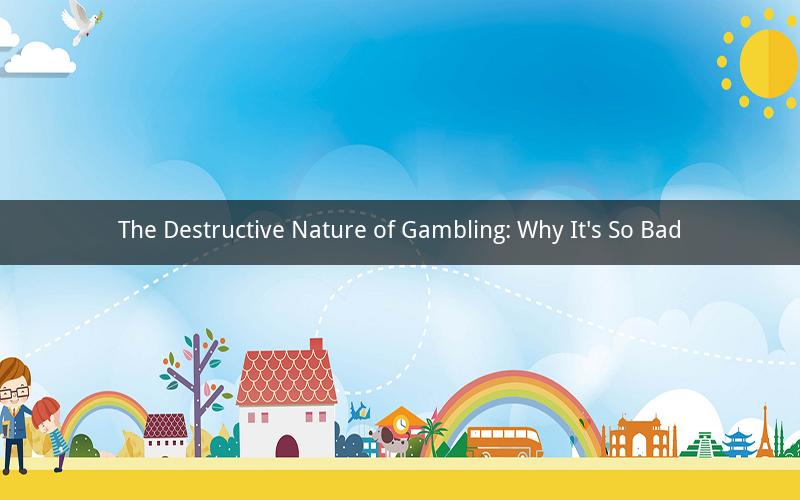
Gambling has been a part of human culture for centuries, captivating people with its promise of wealth and excitement. However, despite its allure, gambling has been widely criticized for its negative impacts on individuals, families, and societies. In this article, we will explore why gambling is considered so bad, examining its effects on mental health, financial stability, and social relationships.
Mental Health Consequences
One of the primary reasons why gambling is considered so bad is its detrimental effects on mental health. Individuals who engage in excessive gambling often experience feelings of anxiety, depression, and addiction. According to the National Council on Problem Gambling, approximately 2-3% of the adult population in the United States has a gambling problem.
Gambling addiction can lead to a wide range of mental health issues, including:
1. Anxiety: The constant need to win and the fear of losing can cause severe anxiety, leading to panic attacks and other stress-related disorders.
2. Depression: The loss of money and the strain on personal relationships can contribute to feelings of sadness and hopelessness.
3. Substance Abuse: Many individuals with gambling problems turn to alcohol or drugs as a means of coping with their addiction.
Financial Ruin
Another reason why gambling is considered so bad is its potential to cause financial ruin. While winning big is the dream of many gamblers, the reality is that the odds are typically stacked against them. This can lead to massive debt and a loss of financial stability.
The following factors contribute to the financial consequences of gambling:
1. The house always wins: Casinos and other gambling establishments are designed to ensure that they make a profit. The odds are typically in their favor, making it difficult for players to win consistently.
2. Loss of control: Problem gamblers often lose track of time and money, leading to massive debts that can take years to pay off.
3. Borrowing money: To fund their gambling habits, individuals may turn to loans, credit cards, and other forms of borrowing, which can further exacerbate their financial problems.
Social Relationships
Gambling can also have a devastating impact on social relationships. Individuals who are addicted to gambling may neglect their families, friends, and careers, leading to strained relationships and even divorce.
The following ways in which gambling can harm social relationships include:
1. Financial strain: The debt incurred from gambling can lead to arguments and tension within families.
2. Time spent gambling: Problem gamblers often prioritize gambling over their personal relationships, leading to neglect and resentment.
3. Dishonesty: Many individuals with gambling problems lie to their loved ones about their habits, which can damage trust and lead to relationship breakdowns.
Legal and Ethical Concerns
Gambling is also a source of legal and ethical concerns. In some cases, it can lead to illegal activities, such as fraud and theft, to fund gambling habits. Additionally, the proliferation of gambling establishments can lead to increased crime rates and other societal issues.
The following legal and ethical concerns associated with gambling include:
1. Fraud: Some individuals may resort to fraudulent activities to fund their gambling habits, such as embezzling money from their employers or engaging in credit card fraud.
2. Organized crime: In some cases, gambling can be linked to organized crime, leading to increased violence and corruption.
3. Social issues: The presence of gambling establishments can lead to increased crime rates, public intoxication, and other social issues.
Alternatives to Gambling
Given the negative consequences of gambling, it's essential to consider alternatives that can provide similar levels of excitement and entertainment without the risks. Some popular alternatives include:
1. Sports betting: While still involving risk, sports betting can be a more controlled and socially acceptable form of gambling.
2. Entertainment: Engaging in hobbies, such as playing music, painting, or gardening, can provide a sense of accomplishment and entertainment without the risks associated with gambling.
3. Volunteering: Helping others can be a fulfilling way to spend time and improve your mental health.
Conclusion
In conclusion, gambling is considered so bad due to its negative effects on mental health, financial stability, social relationships, and legal and ethical concerns. While it may seem like a harmless form of entertainment, the risks associated with gambling are significant and can have long-lasting consequences. It's essential to be aware of these risks and consider alternatives that can provide similar levels of excitement and entertainment without the dangers.
Questions and Answers:
1. Q: Can gambling addiction be treated?
A: Yes, gambling addiction can be treated with various forms of therapy, including cognitive-behavioral therapy, group therapy, and medication.
2. Q: Is it possible to gamble responsibly?
A: While it is possible to gamble responsibly, it requires discipline and self-control. Setting limits on time and money spent on gambling can help reduce the risk of addiction.
3. Q: How can I support a loved one struggling with a gambling addiction?
A: Offering support, understanding, and encouragement can help a loved one struggling with a gambling addiction. Encouraging them to seek professional help is also essential.
4. Q: Are there any legal measures in place to prevent gambling addiction?
A: Yes, some states and countries have implemented laws and regulations to prevent gambling addiction, such as age restrictions and mandatory self-exclusion programs.
5. Q: Can gambling be a source of income for individuals?
A: While it is possible for some individuals to make a living from gambling, the odds of success are typically low. It's important to approach gambling as a form of entertainment rather than a guaranteed source of income.